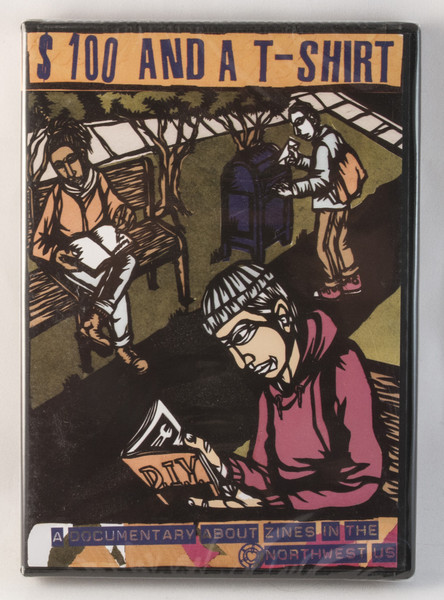
$100 & a T-Shirt: A Documentary About Zines in the Northwest
by Joe Biel Author, Nickey Robo Author and Rev Phil Sano Author
A cultural analysis of what causes zine makers to tick; what the hell zines are, why people make zines, the origin of zines, the resources and community available for zine makers, and the future of zines. Interviews with about 70 zine makers, ex-zine makers, and readers from the northwest. Featuring footage of the Portland Zine Symposium, a zine bicycle tour of Portland, and activities bringing zine culture to life. An original documentary culled from over 64 hours of footage. Best suited for people with a new interest in zines, pros, and novices. The video sparks untapped creativity and new interest into zine making and reading. Music by J Church and Defiance, OH! Created by Basil Shadid, Rev. Phil Sano, Nickey Robo, and Joe Biel. 51 minutes with 47 minutes of bonus material.
*** Winner of Microcinema Fest "Best Documentary" Award!
Contact us if you are interested in setting up a screening in your town!
$100 & A T-Shirt from Joe Biel on Vimeo.
You must log in to comment.
























Comments & Reviews
"Anyone who has ever picked up a zine knows well that the unique freeform style of these DIY publications can make for some pretty exciting reading. Produced over the course of four years, this documentary delves into the wild world of zines by traveling to the Portland Zine Symposium to speak with the writers and publishers firsthand. For anyone who has ever wondered what makes the world of zines tick, this cultural analysis will prove fun and informative glimpse into a DIY culture that isn't willing to sacrifice creativity and originality for commercial interests."
anyone know where the $2 VHS link is ??
"$100 and a T-shirt is a wonderful documentary chronicling the Portland Oregon zine scene circa 2004. There are tons of interesting interview snippets with zinesters that exemplify the diversity of motivation for and approaches to do-it-yourself publishing, and a little zine history and lore going back as far as Martin Luther. My one observation which might not be obvious to the uninitiated is that the world of zines, mail art, and DYI is even more vast and diverse than represented here. The Portland zine community tends to lean punk, grunge, anarchist, riot grrrl, slacker, etc. While that's delightful, it would be just plain wrong to think or suggest said package of values, though common enough, are in any way inherent to self publishing. I don't know why anyone wouldn't want a copy of this DVD. they should be playing this on PBS. "
This is a great entertaining dvd. Very helpful too. I liked the casual format
i'll TRY make it short and sweet.
this is a cool video for people who wanna know why people often say magazine without the "maga-" and for those who thought that DIY people were all hippies, weirdos, or broke losers.
i ended up passing this tape around to friends after I watched it with my family, and they all thought it was thorough and interesting too.
i agree that there should be more zines for kids, and it's nice to see that one of the zinesters interviewed is a little girl.
i recommend going cheap (the zinester way) and buying the $2 VHS, but apparantly the commentary is not to be missed...so whatever.
Valuable as a peek inside the subculture or as a guide of sorts, this video documents the Portland zine scene and its inhabitants.
Zines are so readable because the subject matter isn’t dumbed down for you, homogenized by the filters of a corporate culture or edited by anyone other than the creator herself. You’re getting the info (or diary or opinion) straight from the horse’s mouths. Except these horses are independent publishers who don’t stand to make a dime on their efforts.
Your first question might be “Why bother?” and that’s what this documentary asks, both of the creators and of the cultural historians who are compiling a library/workshop by and for the zine scene. The closest thing to an answer may be the DIY aesthetic that launched the punk movement in the ‘70s: because they can, and without the interference, ass kissing, and frustration more conventional writers face to be heard. Why write obituaries and shit local interest stories for a newspaper for 5 years to earn a byline on a story you’re passionate about? Sidestep the corporate red tape, write what you want, and publish it yourself. Most zines cost $1 to $2, and that covers labor, printing, construction, and distribution. Profit? Not likely, at least not in the traditional sense.
There’s some debate early on as to what constitutes “selling out”. One creator draws the line at selling ads; another thinks that anything that can be done to facilitate the printing and distribution of a zine is perfectly OK. Regardless of where you stand on the issue, the passion and dedication of these folks is undeniable. Can most of us say that about our work?
As hobbies go, zine creation is both fulfilling and grueling. Distribution is as a dicey proposition as creation, often yielding no cash but plenty of gratification. Like the most big-budget documentaries, $100 inspires curiosity and interest. Shot and edited in the same DIY spirit as the zines it covers, this DVD is a winner.
Early in this documentary about zine culture, Moe Bowstern of the zine Xtra Tuf describes the experience of bringing zines onboard a working boat. "My skipper said 'I could do a zine!'" says Bowstern. "You just write about what you did today and what you ate and put a recipe in there and then you write about your bike and then you write about stealing something!" Bowstern goes on to say that the skipper wrote something for the publication Pacific Fisherman which paid him $100 and a t-shirt. "And I said, 'Fred, if I give you a shirt and a hundred bucks, will you write for me too?'"
The skipper argues that zines aren't real writing. He's the only nay sayer in this hour survey of zine culture in Portland, OR. As the documentary unfolded, I thought it would make perfect viewing for people like the skipper or my mom; people who don't understand the whole concept. But by the end I was questioning why it had been so long since I had made a zine myself.
The DVD is organized into chapter headings that cover topics like Who Makes Zines? and How Are Zines Distributed? But this isn't really a how-to guide; more like a celebration. The filmmakers were smart to focus on the Portland scene. The point isn't to tell the comprehensive story of zines, even the story of zines in Portland. But by selecting such a slender piece of the pie, this [talkie] hasn't made me full but rather hungry for more pie. Surely the hunger is the point; to go out and create and search on my own, not just to be content with living vicariously by watching people on a DVD.
Like a good zine, the documentary is high quality (the video and audio are top notch with smart music and graphics) without being slick. Mostly this is a film of talking heads talking about themselves, their work, and the bigger picture. It's good to see zines getting the same documentary treatment that music has long received. A few stories are illustrated by "dramatic recreations", that are surprisingly charming, not annoying. The credits note tha this production was assembled using only borrowing materials - very cool indeed.
Yeah so, I'm listening to the commentary tracks and laughing my ass off. If you guys haven't watched this while checking out the commentary tracks you should run and do that now.
All of my favorite people in portland are in this documentary; myself included.
salut c av a
Lovely. Now I can just hand it to whom ever asks me, "What's a zine?".
Informative and entertaining essay on Zine Culture. The "talking heads" are for the most part well-spoken, interesting, and well-versed about zines. I would recommend this DVD to educators who teach courses on independent media, as well as zine makers and zine readers who want to know more about zines in the Northwest.
Something of a snapshot of the zine scene in the Pacific Northwest but its real value is as an introduction to the subculture. It's something you can show those perplexed friends and family members who don't understand what the zine thing is all about.
Around 70 zinesters (including some no longer zining) offer their perspectives on the many aspects of what is for some a hobby and for others a lifestyle. Some of those featured include Shawn Granton, Alex Wrekk, Donna Kossy, Greig Means, jack saturn, Shannon Wheeler, Dave Roche, Nicole Georges, Moe Bowstern and Icky Apparatus.
It's really a pretty interesting DVD and, believe it or not, the first zine documentary I've had the pleasure to watch (although I know others are out there). Also on the disc is 20 minutes of bonus footage such as a trailer for the film and a cut segment on Sean Tejaratchi's KOOL Man. My only disappointment is that they didn't also include a gallery of zine covers. Most of the zines discussed in the film get some amount of screen time, but I would love to have seen a gallery of them, plus other notable zines from recent years. Still, this is only a minor complaint. Go get this DVD — it's a good way to spend an hour-and-a-half or so.
Lengthy review on ZINE THUG.
Maybe you’ve seen one at a local bookstore or coffee shop on a metal turning rack with rough graphics and interesting and obscure topics adorning the pages. These faceless publications have a powerful voice and philosophy for a community, city or town. Joe Biel explores the makings and social culture of zines in “A Hundred Dollars and T-shirt.”
Biel’s film takes place in Portland, Oregon where most zinesters find that their creativity and lifestyle can flourish. Zinesters range from early teens to mid-30s and build their lives on creating zines and supporting the zine community. The film explores creators of different types of zines, shedding light on individual reasons for making zines and the humble lifestyle one must expect from making this art form a way of life.
The scope of zinesters this film covers allows for a great description and educational background on zines from various perspectives. The interviews with creators inspire the viewer to take life into their own hands and create their own zine. The film covers how many creators put together their zine, how they get it distributed, and the way to connect business relations with other zinesters.
“Hundred Dollars” humanizes the zine process by giving these paper booklets faces. The contents of the film are thorough and captivating, but the presentation of the film is amateur and boring at times. From beginning to end, the film loses momentum, mostly due to repetition of style and content. The editing serves as a divider between topics that thwarts smooth transitions. Usually elements like these make for a poor film, but the subject of the film itself is a low-budget art work. In this way, the film reflects the topic.
This is awesome! There are interviews with over 60 zine creators, people who've been around for years , and those who've only just started up, from kids to old timers. Personally I found this amazingly inspiring, and made me start writing bits n pieces for the personal zine that I always mean to put out, but never quite get around to finishing. Likewise those who saw this at the London Zine Symposium seemed to really enjoy it, and talking to a few people outside of the screening they seemed to get as much inspiration from it as I had done. I can't recommend this highly enough.
Some of you kids out there may not remember this, but once upon a time San Francisco was the Zine Capital. That title undoubtedly now belongs to Portland. $100 was made by Joe Biel, zine publisher, co-head of Microcosm [Publishing], and [former] co-organizer of the Portland Zine Symposium. Joe made this documentary to not only caputre the zine scene in Portland, but to also give a good, comprehensive overview of zines: their history, what they are, why and how people make them. It's sort of like a video version of Stolen Sharpie Revolution, except not as how-to. $100 includes interviews with several zine publishers (my favorite bits featured Moe of Xtra Tuf), plus Chloe of the zine store Reading Frenzy, and folks from the Independent Publishing Resource Center. Joe's lack of filmmaking experience gives the film a tue DIY feel - the lighting isn't perfect, there are occasional sound problems - but this only adds to the authenticity of the work. It feels like you are watching a zine about zines. My only complaint is this: The final segments feature a lot of complaining from the interviewed publishers, and while this may be an accurate representation of the zine community, I truly wish the end of the film were as uplifting and inspirational as the rest of it. Why end on a sour note? Regardless, $100 & A T-Shirt gets a strong recommendation. But it to put faces to familiar zine publishers' names, or to hear what other zinesters have to say about what we're doing and why, or to show to people who ask you "what the heck is a zine anyway?" Just buy it..
Some say patriot pamphleteer Thomas Paine was the first zinester; others nominate Martin Luther and his nailed-to-the-door Theses. What's important, though, is that their uncensored, iconoclastic spirit lives on in the thousands of folks who publish their own musings on everything from substitute teaching to shoe collecting. The engaging documentary "A Hundred Dollars and a T-Shirt" profiles Portland's considerable contribution to the movement, featuring interviews with Chloe Eudaly, founder of zine shop Reading Frenzy, and dozens of the mainstays who have made Portland a center of DIY culture. They're all so wonderfully friendly and down-to-earth that even if you're not moved to pour your own soul out onto photocopied pages of clip art, you'll surely be moved to check out theirs.
Somehow it's not surprising that the documentary focuses on Portland, as it just seems to make sense that there'd be a very active sub-culture revolving around zines in that city. The publishers themselves are an assorted lot, but every single one of them has insightful missives to share, and the passion with which each approach their zine journey is clearly evident. I really enjoyed this glimpse into this world, and actually found myself seeking out some online distributors after watching, so I could order myself some real-world examples of this unheralded, but very active, type of literature.
Like the best of the zines it celebrates, A Hundred Dollars and a T-Shirt is rough and elegant, but always sincere and passionate. A Hundred Dollars literally holds its subjects at a distance, but in return viewers get to see zine makers and fellow travelers in their larger contexts of, mostly, work and home. As the people become familiar, don’t be surprised if your eye starts wandering to walls, worktables, and the like, all of which offer some additional insight into the world of the film...A critical discussion of gender that takes note of sexism, and even misogyny and violence towards women, adds to the film’s complexity, but it also opens a door to questions of difference and conflict. It might be reasonable to assume that people who spend their time producing countercultural media, and who embrace marginality, would not be subject to the same social norms regarding race, ethnicity, and sexuality as the dominant culture in which they are located, but the film includes an explicit admonition not to make this assumption when it comes to gender. It is hard not to ask questions about other forms of identity and whether there is racism and homophobia at work in the zine community just as there is sexism and a certain degree of male dominance. While Portland has become more ethnically and racially diverse over the past 20 years or so, it not only remains a largely white city, but white to the point where it is easy for those in the majority to believe that race is not an issue without being called on it very often. Maybe the filmmakers simply went where their subjects took them or maybe they consciously chose not to ask about race (or sexuality). I mention issues of difference and other media mostly because the filmmakers also chose to address them. These aren’t so much criticisms as testaments to how effective A Hundred Dollars is at sparking interest in its subject.
This rather wonderful film examines the whole of zine culture via a series of interviews with people who have written them on every topic, from music to sci-fi to gay culture and just about every point in between. At one point, between the late ‘70’s punk explosion and the late ‘90’s, fanzines were really the glue that held scenes together, defining nascent genres as they bubbled up from the primordial soup and filling in the information gaps mainstream publishing didn’t acknowledge. The directors of “$100 And A T-Shirt” have tracked down an unbelievable number of them and put their comments into an informative, quirky film, and roped in terminal zine inhabitants J Church to provide a splendid and truly fitting soundtrack. The range of zines discussed is truly mindboggling, and there’s plenty of how-to information in case you feel inspired.
A discerning documentary that delves into the depths of the underground zine publishing network of the northwest. The documentary serves as a comprehensive informational/instructional video about of zine publishing.
In the eighties, both heavy metal and punk rock literally breathed in the underground through 'zines. A lot of established and outright famous figureheads of rock have attested that independent writing of the day had as much value to their success as a cover story on Hit Parader. While the professionalism of 'zine writers is as questionable as the sometimes mutiliating online geek squadron (on a personal note, I've had many people write me and say most bloggers offer up a non-committal two sentence opinion of a CD and call it a "review"), there are plenty of unsung heroes in the music promotion and appreciation society. This, in essence, is the largest message pleaded by A Hundred Dollars and a T-Shirt, the fact that a number of serious-minded and talented writers are lurking about in left-of-center typed pastures, and perhaps the underground in Portland are chit-chatting about Ayleen Crotty and Franco Ortega in their local coffeehouses as much as any local art community touts their own.
Coming to microcinema at the end of a long trail that included involvement in comix and minicomics and ‘zines, it has always struck me as odd that there has not been more crossover between these two aspects of DIY culture. Microcosm Publishing’s Joe Biel takes a stab at correcting that oversight with A Hundred Dollars and a T-shirt, his engaging documentary of the ‘zine movement.
Biel’s documentary is largely driven by oral history, as he interviews an impressively large group of contemporary zinesters, many circling the hub of the Portland zine movement (where Microcosm Publishing was located at the time), including zinesters I enjoy reading like Moe Bowstern and Alex Wrekk. We also get glimpses of zine conventions and a zine library, but largely, like zines often do themselves, the story is told through the personal experiences of the interviewees.
Thankfully the zinesters are, by and large, unique people with a lot of interesting things to say, which smooths over some rough spots in production value. Like the zines discussed here, the technical quality of the documentary varies widely.
Those interested in zine culture themselves will undoubtedly overlook the technical shortcomings, and others will find an engaging primer in another aspect of the “Do-It-Yourself” culture. Hardcore zinesters will find much to enjoy here, and will undoubtedly want to nudge my rating a bit higher.
I hope Joe Biel continues to cross the boundaries separating parts of the scene, and that others follow suit.
A totally unwatchable documentary. People seem to like this movie. Not me. But I'm probably biased because I'm in it.
definitely the best bargain in honor of Independent Publishing Month and a neat treat for your geeky friend or neighbor. If you need to buy only one item to represent your passion for writing, make it this DVD.
Though zines have been published since at least the 1920s when sci-fi fans began producing their self issued writings devoted to the genre, there has been few attempts to document the history and culture of zine making in a narrative form. This is perhaps the first documentary to provide a comprehensive overview of zines and zine makers and is a welcome document on this facet of underground art and media.
Some of the most interesting points in the documentary occur when there is a divergence of opinions on a topic, such as the discussion on pricing and profit, selling out, and making a living from zines. The makers cover a significant amount of ground and they largely succeed in creating a work that informs and entertains both those with only a minimal knowledge of zines as well as those immersed in the culture. Anyone involved with zines is likely to enjoy hearing the thoughts and perspectives from other zine makers (and might also appreciate seeing some of their favorite zinesters being interviewed). Also, the documentary provides an excellent introduction, and perhaps source of inspiration, to someone new to zines.
$100 & A T-Shirt is a valuable and much needed documentary on zines and zine culture. Anyone interested with an interest in alternative media and publishing is likely to enjoy this excellent documentary.
This DVD is by, for, and about the folks putting the "geek" back in "zine geek". Zine zealotry extends far beyond the punk community, as the film clearly shows. If you are an ardent supporter of the small, independent free press for its own sake - and in this age of McClearChannel, outlets for alternative points of view are more crucial than ever - you'll find this worthwhile and inspiring.
Imagine being part of a zine scene large enough to make a documentary about it. That's what Portland has and the documentary is called $100 & A T-Shirt. It really inspires you to continue to do what you are doing, or it can inspire you to start a zine as well. Anyone who has ever made a zine, plans to make a zine one day, or anyone who has ever read a zine should check it out.
I found this film full of great advice. While some shine on camera, others seem shy and confused, often rambling about nothing important. The best part is the positive notion that we live in a time and place where anyone with a message can write it down, steal photocopies, and people will read it.
Watching this movie makes me nostalgic for that kind of insular “we’re really doing something!” community that I used to feel so invested in - hanging out at Kinkos all night long scamming thousands of copies with my friends, convinced that we were bringing the revolution.
There are some interesting women in this movie. Moe Bowstern is dynamic and captivating, a great storyteller. In fact the title of the movie comes from a story about a skipper on a boat she worked on, who wouldn’t write for her zine, even when she offered him the same thing he received for writing for a trade magazine (a hundred bucks and a t-shirt). I related to the way Nicole Georges described her artistic process, as something she just has to do – fill up a blank book with artwork and writing, then take the least emo parts and make it into a zine. Krissy Durden told a great story about meeting a girl who said Krissy’s zine saved her mom’s life by convincing her not to have gastric bypass. Korrina Irwin talked about zines as an outlet for talking about mental health. These stories rang true and struck deep into my experience of the zine world during the hayday of Riot Grrrl (mid-nineties), when zines were helping so many young women connect the most personal aspects of our lives to the overwhelming political reality we lived in.
The juiciest and most entertaining parts of the movie were 1) watching people read reviews of their own zines – this was where people got animated and showed their personalities; and 2) the acknowledgement of scene hierarchy in the zine world. I liked what Kim Fern had to say about the way younger zine makers will look up to and idolize certain older zine stars, projecting their own insecurities onto these “cool” people they want to be like. Moe gave a great sound byte on the subject: “For all that people are anti-authoritarian in the zine world, people are really into creating heroes.” Coincidentally, Kim and Moe are probably the two most recognizable people in the movie.
There are a number of good deleted scenes in the special features - especially the “pulp history” one, which describes the genesis of science fiction fanzines – but the commentary with the film makers is hard to watch. Every time Joe Biel starts getting into some interesting backstory, Alex Wrekk cuts him off to go “hey there’s me,” or “I hate that chair in our house” or “there’s our cat.” One funny thing that does get pointed out in the commentary, though, is that when asked “why do you do a zine?” almost all the men said “control,” while the women said things like “community,” “connections” and “freedom to express myself.”
But I really am glad they made it. I do believe in the DIY ethic, and I love the idea of documenting our own communities. These people are cute and dorky and earnest and I’m sure their lives are interesting. For all of you reading who like pop punk, who want to get a basic understanding of zines, and who are inspired by the prolific Portland underground scene, you should totally get this documentary, learn about zine culture, and then start your own zine.
I never thought I would see a documentary about zines. But leave it up to Microcosm, the overtly obsessed publishing collective (who happen to rock… hard) to make one! As the foundation of the annual Portland Zine Symposium they have made a visual display of the festival, as well as get to the core of zine making from fellow zinesters, printers, librarians (Portland has it’s own zine library that is funded through grants… why can’t the rest of the world catch up!?!), and other cogs involved in everything from initial thought to realized output. It’s a very thorough documentation and Portland is lucky to have such a thriving zine scene that supports itself on such a large scale. I personally love that city, and the community-oriented vibe I get every time I’m there. I’m going to have to make a point to stop at Microcosm next time I’m there and see if I can’t pick up some inspiration to get back into theart of zine-making again (watching this documentary helps). Aside from personal aspirations, it’s kind of funny to listen to individual zinesters gripe about their own issues as I see things very differently about producing and distributing zines. First of all, everyone in this video looks like a cast extra from “Napolean Dynamite”, which really lends credence to those who stereotype all zinesters as lonely nerds (though I don’t think any of us have ever argued that we’re not). They seem to vehemently despise large-scale distribution (which I don’t really understand as I have participated in that arena before and it’s hardly a sell-out as long as you keep your ideals intact, and actually quite easy to stay ahead in), and dislike charging over $2 for their creation (but then complain about money… I see the argument, but there is nothing wrong about making a few bucks off of something you put so much hard work into… it actually can help!). I also wish they at least took a glance at some zinesters who weren’t from Portland, or maybe someone who does a music zine (probably the most common of punk-related zines) rather than a personal-based one, just to get a more rounded-out story. Otherwise, it was great little piece of culture that really hit home and made me feel some comadarie with individuals that do what I have done.
If you've seen Stolen Sharpie Revolution, if you've been to the Portland Zine Symposium, if you do a zine yourself, or if you are interested in the cultural aspects of the zine making, or if any of these things strike you as remotely interesting, then this is a video you must see. It's about making zines with how-to information, but it's much more about the phenomenon of zines and the passion behind them. Zines that are self published, quirky, and obsessed passionately with whatever they are about. This film does a really good jobof covering the basics by interviewing a wide assortment of people involved in zine making in the Portland area. Zinesters from different walks of experience talk about how they got started and what keeps them going; the hard work and the rewards. In many ways this was like going to the Portland Zine Symposium: you meet some old and new friends whose faces you've never seen or don't see often enough, you see a wide variety of self publishing with a variety of techniques, styles and genres represented, you feel the passion of other people's passions, you take away some new ideas and inspiration, and acknowledge with some respect those people who are making the resources available to share their knowledge and in this case document our very unique community (or culture). I think it's rad and I recommend this.
Not a zine, but a documentary on zines. I picked this up at the Boston Zine Fair and to be perfectly honest I wasn't expecting a whole lot. But I saw it at the Microcosm table and it was only $8 so I figured even if all I did was watch it and make fun of it it would be worth that much. So imagine my surprise when I watched the thing and I actually enjoyed it. I found it to be a well done, somewhat comprehensive look at the history of zines and zine culture. Obviously they can't cover everything and everybody, but on the whole they did a really good job. The interviewees were all intelligent and well spoken (special mention should go to Moe who does the zine X-TRA TUF who impressed me so much that the day after I watched the DVD I sent
away to Microcosm to order her zine. I should also mention that Shawn Granton had a semi ridiculous looking beard, but he did give wrestling fans their props for their overlooked role in the history of zines so that made up for it. And at first I thought Dave ON SUBBING Roche looked like a young Eugene Levy, but now I realize I was wrong. If he looks like anyone from the cast of SCTV it would have to be Rick Moranis, but he doesn't really look like him either. But seeing him and remembering the incident he wrote about in his zine where one of his students called him Urkel made me laugh because I can see what the kid was thinking.) There were a few moments that made me wanna chuck my shoe at the TV (honest to God, if you're making a documentary that's filled with 99.999% white people you shouldn't talk about diversity unless you're talking about how there isn't any) and the production can be rough at points, but it kind of
adds to the charm (although there was one bit... OK, if you're being
interviewed for a documentary and there's someone with a camera talking to you you might wanna turn off the damn stereo. I love the Eels, but I don't wanna hear them in the background while you're trying to pontificate) All in all I think this is the type of thing that would be of interest to any zinester or anyone who's trying to learn about zines. It's not perfect, but it's as good a starting point as any. Oh, and I just love Christy C. Road's drawings. Fuck, can she draw. I am jealous. Send $8 + $1.50 postage for media mail (check www.microcosmpublishing.com if you're interested in anything other than media mail. Because media mail sucks. You save a bit of money with it, but it's generally pretty shitty and I should know better than to use it.)
While there are plenty of zine histories in existence (though hardly as many as there should be) it's nice to see a documentary to fill in the gaps. Though apparently focused on the vibrant Portland scene, much of the material is applicable to other locales and the zine community in general. A wide variety of zinesters are featured, from the owner of Reading Frenzy to creators of zines like Brainscan, On Subbing, Invincible Summer, and Nosedive. The diversity and sheer amount of information contained in this documentary makes this nearly indispensable for serious zinesters. At times the sound and image quality leaves much to be desired, but this only reflects the DIY nature of zines, where sometimes the information itself is more pressing than the quality of distribution. Despite these issues, the whole dvd gets its point across clearly, and is definitely worth a view.